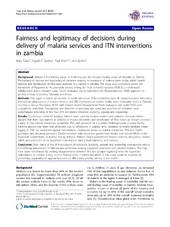| dc.description.abstract | Background: Malaria is the leading cause of morbidity and the second leading cause of mortality in Zambia. Perceptions of fairness and legitimacy of decisions relating to treatment of malaria cases within public health facilities and distribution of ITNs were assessed in a district in Zambia. The study was conducted within the Framework of Response to Accountable priority setting for Trust in health systems (REACT), a north-south Collaborative action research study, which evaluates the Accountability for Reasonableness (AFR) approach to priority setting in Zambia, Tanzania and Kenya. Methods: This paper is based on baseline in-depth interviews (IDIs) conducted with 38 decision-makers, who were Involved in prioritization of malaria services and ITN distribution at district, facility and community levels in Zambia, One Focus Group Discussion (FGD) with District Health Management Team managers and eight FGDs with outpatients’ attendees. Perceptions and attitudes of providers and users and practices of providers were systematized according to the four AFR conditions relevance, publicity, appeals and leadership. Results: Conflicting criteria for judging fairness were used by decision-makers and patients. Decision-makers argued that there was fairness in delivery of malaria treatment and distribution of ITNs based on alleged excessive Supply of free malaria medicines, subsidized ITNs, and presence of a qualified health-provider in every facility. Patients argued that there was unfairness due to differences in waiting time, distances to health facilities, erratic supply of ITNs, no responsive appeal mechanisms, inadequate access to malaria medicines, ITNs and health Providers and uncaring providers. Decision-makers only perceived government bodies and donors/NGOs to be legitimate stakeholders to involve during delivery. Patients found government bodies, patients, indigenous healers, chiefs and politicians to be legitimate stakeholders during both planning and delivery. Conclusion: Poor status of the AFR conditions of relevance, publicity, appeals and leadership corresponds well to the differing perceptions of fairness and unfairness among outpatient attendees and decision-makers. This may have been re-enforced by existing disagreements between the two groups regarding who the legitimate stakeholders to involve during service delivery were. Conflicts identified in this study could be resolved by promoting application of approaches such as AFR during priority setting in the district. | en_US |

